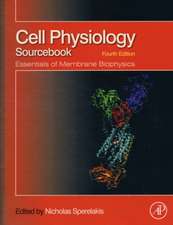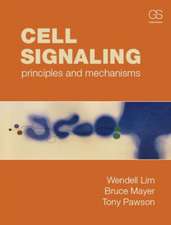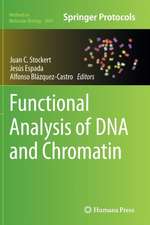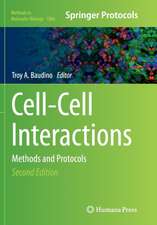Microfluidic Techniques: Reviews and Protocols: Methods in Molecular Biology, cartea 321
Editat de Shelley D. Minteeren Limba Engleză Hardback – 15 noi 2005
| Toate formatele și edițiile | Preț | Express |
|---|---|---|
| Paperback (1) | 639.25 lei 6-8 săpt. | |
| Humana Press Inc. – 9 dec 2010 | 639.25 lei 6-8 săpt. | |
| Hardback (1) | 645.47 lei 6-8 săpt. | |
| Humana Press Inc. – 15 noi 2005 | 645.47 lei 6-8 săpt. |
Din seria Methods in Molecular Biology
- 9%
 Preț: 791.59 lei
Preț: 791.59 lei - 23%
 Preț: 598.56 lei
Preț: 598.56 lei - 20%
 Preț: 882.95 lei
Preț: 882.95 lei -
 Preț: 252.04 lei
Preț: 252.04 lei - 5%
 Preț: 802.69 lei
Preț: 802.69 lei - 5%
 Preț: 729.61 lei
Preț: 729.61 lei - 5%
 Preț: 731.43 lei
Preț: 731.43 lei - 5%
 Preț: 741.30 lei
Preț: 741.30 lei - 5%
 Preț: 747.16 lei
Preț: 747.16 lei - 15%
 Preț: 663.45 lei
Preț: 663.45 lei - 18%
 Preț: 1025.34 lei
Preț: 1025.34 lei - 5%
 Preț: 734.57 lei
Preț: 734.57 lei - 18%
 Preț: 914.20 lei
Preț: 914.20 lei - 15%
 Preț: 664.61 lei
Preț: 664.61 lei - 15%
 Preț: 654.12 lei
Preț: 654.12 lei - 18%
 Preț: 1414.74 lei
Preț: 1414.74 lei - 5%
 Preț: 742.60 lei
Preț: 742.60 lei - 20%
 Preț: 821.63 lei
Preț: 821.63 lei - 18%
 Preț: 972.30 lei
Preț: 972.30 lei - 15%
 Preț: 660.49 lei
Preț: 660.49 lei - 5%
 Preț: 738.41 lei
Preț: 738.41 lei - 18%
 Preț: 984.92 lei
Preț: 984.92 lei - 5%
 Preț: 733.29 lei
Preț: 733.29 lei -
 Preț: 392.58 lei
Preț: 392.58 lei - 5%
 Preț: 746.26 lei
Preț: 746.26 lei - 18%
 Preț: 962.66 lei
Preț: 962.66 lei - 23%
 Preț: 860.21 lei
Preț: 860.21 lei - 15%
 Preț: 652.64 lei
Preț: 652.64 lei - 5%
 Preț: 1055.50 lei
Preț: 1055.50 lei - 23%
 Preț: 883.85 lei
Preț: 883.85 lei - 19%
 Preț: 491.88 lei
Preț: 491.88 lei - 5%
 Preț: 1038.84 lei
Preț: 1038.84 lei - 5%
 Preț: 524.15 lei
Preț: 524.15 lei - 18%
 Preț: 2122.34 lei
Preț: 2122.34 lei - 5%
 Preț: 1299.23 lei
Preț: 1299.23 lei - 5%
 Preț: 1339.10 lei
Preț: 1339.10 lei - 18%
 Preț: 1390.26 lei
Preț: 1390.26 lei - 18%
 Preț: 1395.63 lei
Preț: 1395.63 lei - 18%
 Preț: 1129.65 lei
Preț: 1129.65 lei - 18%
 Preț: 1408.26 lei
Preț: 1408.26 lei - 18%
 Preț: 1124.92 lei
Preț: 1124.92 lei - 18%
 Preț: 966.27 lei
Preț: 966.27 lei - 5%
 Preț: 1299.99 lei
Preț: 1299.99 lei - 5%
 Preț: 1108.51 lei
Preț: 1108.51 lei - 5%
 Preț: 983.72 lei
Preț: 983.72 lei - 5%
 Preț: 728.16 lei
Preț: 728.16 lei - 18%
 Preț: 1118.62 lei
Preț: 1118.62 lei - 18%
 Preț: 955.25 lei
Preț: 955.25 lei - 5%
 Preț: 1035.60 lei
Preț: 1035.60 lei - 18%
 Preț: 1400.35 lei
Preț: 1400.35 lei
Preț: 645.47 lei
Preț vechi: 759.37 lei
-15% Nou
Puncte Express: 968
Preț estimativ în valută:
123.53€ • 127.61$ • 102.81£
123.53€ • 127.61$ • 102.81£
Carte tipărită la comandă
Livrare economică 25 martie-08 aprilie
Preluare comenzi: 021 569.72.76
Specificații
ISBN-13: 9781588295170
ISBN-10: 1588295176
Pagini: 247
Ilustrații: X, 248 p.
Dimensiuni: 155 x 235 x 20 mm
Greutate: 0.56 kg
Ediția:2006
Editura: Humana Press Inc.
Colecția Humana
Seria Methods in Molecular Biology
Locul publicării:Totowa, NJ, United States
ISBN-10: 1588295176
Pagini: 247
Ilustrații: X, 248 p.
Dimensiuni: 155 x 235 x 20 mm
Greutate: 0.56 kg
Ediția:2006
Editura: Humana Press Inc.
Colecția Humana
Seria Methods in Molecular Biology
Locul publicării:Totowa, NJ, United States
Public țintă
Professional/practitionerCuprins
Microfabrication Methods.- Overview of Advances in Microfluidics and Microfabrication.- to Microfabrication Techniques.- Fabrication of Polydimethylsiloxane Microfluidics Using SU-8 Molds.- Fabrication of Microelectrodes Using the Lift-Off Technique.- Laser Ablation as a Fabrication Technique for Microfluidic Devices.- Reversible, Room Temperature Bonding of Glass Devices for Microfluidics.- Biological Applications.- Solid-Phase Extraction in Packed Beds on Glass Microdevices.- Fabrication of Micromachined Magnetic Particle Separators for Bioseparation in Microfluidic Systems.- Hydrogel-Immobilized Antibodies for Microfluidic Immunoassays.- Polymerase Chain Reaction in Miniaturized Systems:.- Polymerase Chain Reaction on Microchips.- A Sensitive Sandwich DNA Array Using Fluorescent Nanoparticle Probes.- Microfluidic Ethanol Biobatteries on a Microchip.- Microfluidic Chambers for Cell Migration and Neuroscience Research.- Microtextured Polydimethylsiloxane Substrates for Culturing Mesenchymal Stem Cells.- Contraction Study of a Single Cardiac Muscle Cell in a Microfluidic Chip.- Microscale Integrated Sperm Sorter.
Textul de pe ultima copertă
Over the last ten years, miniaturization has dramatically shrunk the size of both cellular telephones and chemical instrumentation, and now also holds the promise of developing portable, inexpensive, and disposable analytical systems on a microchip. In Microfluidic Techniques: Reviews and Protocols, hands-on researchers review the principles behind successful miniaturization and describe the key techniques for miniaturizing large-scale biochemical and bioanalytical methods for microchip analysis. The authors cover not only the most popular methods for the fabrication of microchips (photolithography, laser ablation, and soft lithography), but also microfluidic techniques for such bioanalytical assays and bioprocesses as DNA analysis, polymerase chain reaction (PCR), immunoassays, and cell reactors. Highlights include PCR on a microchip, microscale cell culturing, and the study of cellular processes on a microchip. The protocols follow the successful Methods in Molecular Biology™ series format, each offering step-by-step laboratory instructions, an introduction outlining the principles behind the technique, lists of the necessary equipment and reagents, and tips on troubleshooting and avoiding known pitfalls.
Comprehensive and informative, Microfluidic Techniques: Reviews and Protocols synthesizes the chemistry, biology, and engineering underlying microfluidic devices so that molecular biologists, as well as analytical and clinical chemists, can advance easily from macroscale to microscale biochemical and bioanalytical techniques.
Comprehensive and informative, Microfluidic Techniques: Reviews and Protocols synthesizes the chemistry, biology, and engineering underlying microfluidic devices so that molecular biologists, as well as analytical and clinical chemists, can advance easily from macroscale to microscale biochemical and bioanalytical techniques.
Caracteristici
Includes supplementary material: sn.pub/extras












